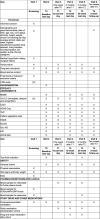A proof of concept phase II study with the PDE-4 inhibitor roflumilast in patients with mild cognitive impairment or mild Alzheimer's disease dementia (ROMEMA): study protocol of a double-blind, randomized, placebo-controlled, between-subjects trial
- PMID: 38438923
- PMCID: PMC10910786
- DOI: 10.1186/s13063-024-08001-3
A proof of concept phase II study with the PDE-4 inhibitor roflumilast in patients with mild cognitive impairment or mild Alzheimer's disease dementia (ROMEMA): study protocol of a double-blind, randomized, placebo-controlled, between-subjects trial
Abstract
Background: Research into the neurobiological underpinnings of learning and memory has demonstrated the cognitive-enhancing effects associated with diverse classes of phosphodiesterase (PDE) inhibitors. Specific PDE inhibitors have been identified to improve neuronal communication through selective inhibition of PDE activity. Roflumilast, a PDE4 inhibitor, has demonstrated efficacy in enhancing episodic memory in healthy adults and elderly participants with pronounced memory impairment, indicative of amnestic mild cognitive impairment (aMCI). In alignment with these findings, the present protocol aims to provide a proof of concept phase II of the potential of roflumilast to aid patients diagnosed with (a)MCI or mild Alzheimer's disease (AD) dementia.
Methods: The study will be conducted according to a double-blind, randomized placebo-controlled, between-subjects design. Participants with (a)MCI and mild AD dementia will be recruited through the Memory Clinic at the Maastricht University Medical Centre + (MUMC +) in Maastricht, the Netherlands, alongside outreach through regional hospitals, and social media. The study will have three arms: placebo, 50 μg roflumilast, and 100 μg roflumilast, with a treatment duration of 24 weeks. The primary outcome measure will focus on the assessment of episodic memory, as evaluated through participants' performance on the 15-word Verbal Learning Task (VLT). Our secondary objectives are multifaceted, including an exploration of various cognitive domains. In addition, insights into the well-being and daily functioning of participants will be investigated through interviews with both the participants and their (informal) caregivers, we are interested in the well-being and daily functioning of the participants.
Discussion: The outcomes of the present study aim to elucidate the significance of the PDE4 inhibition mechanism as a prospective therapeutic target for enhancing cognitive function in individuals with (a)MCI and mild AD dementia. Identifying positive effects within these patient cohorts could extend the relevance of this treatment to encompass a broader spectrum of neurological disorders.
Trial registration: The Medical Ethics Committee of MUMC + granted ethics approval for the 4th version of the protocol on September 10th, 2020. The trial was registered at the European Drug Regulatory Affairs Clinical Trials (EudraCT) registered on the 19th of December 2019 ( https://www.clinicaltrialsregister.eu/ctr-search/trial/2019-004959-36/NL ) and ClinicalTrial.gov (NCT04658654, https://clinicaltrials.gov/study/NCT04658654?intr=roflumilast&cond=mci&rank=1 ) on the 8th of December 2020. The Central Committee on Research Involving Human Subjects (CCMO) granted approval on the 30th of September 2020.
Keywords: Alzheimer; Cognitive dysfunction; Dementia; Drug intervention; Memory; Mild cognitive impairment; Phosphodiesterase 4; Randomized controlled trial; Roflumilast.
© 2024. The Author(s).
Conflict of interest statement
AB and JP have proprietary interest in the PDE4 inhibitor roflumilast.
Figures


Similar articles
-
Acute administration of roflumilast enhances immediate recall of verbal word memory in healthy young adults.Neuropharmacology. 2018 Mar 15;131:31-38. doi: 10.1016/j.neuropharm.2017.12.019. Epub 2017 Dec 11. Neuropharmacology. 2018. PMID: 29241652 Clinical Trial.
-
Study protocol for a randomised, double-blind, placebo-controlled 12-week pilot phase II trial of Sailuotong (SLT) for cognitive function in older adults with mild cognitive impairment.Trials. 2018 Sep 25;19(1):522. doi: 10.1186/s13063-018-2912-0. Trials. 2018. PMID: 30253809 Free PMC article.
-
Acute treatment with the PDE4 inhibitor roflumilast improves verbal word memory in healthy old individuals: a double-blind placebo-controlled study.Neurobiol Aging. 2019 May;77:37-43. doi: 10.1016/j.neurobiolaging.2019.01.014. Epub 2019 Jan 26. Neurobiol Aging. 2019. PMID: 30776650 Clinical Trial.
-
Roflumilast: A potential drug for the treatment of cognitive impairment?Neurosci Lett. 2020 Sep 25;736:135281. doi: 10.1016/j.neulet.2020.135281. Epub 2020 Jul 28. Neurosci Lett. 2020. PMID: 32735939 Review.
-
Roflumilast and cognition enhancement: A translational perspective.Biomed Pharmacother. 2024 Dec;181:117707. doi: 10.1016/j.biopha.2024.117707. Epub 2024 Nov 25. Biomed Pharmacother. 2024. PMID: 39591666 Review.
Cited by
-
The Lung-Brain Axis in Chronic Obstructive Pulmonary Disease-Associated Neurocognitive Dysfunction: Mechanistic Insights and Potential Therapeutic Options.Int J Biol Sci. 2025 May 15;21(8):3461-3477. doi: 10.7150/ijbs.109261. eCollection 2025. Int J Biol Sci. 2025. PMID: 40520003 Free PMC article. Review.
-
Effect of neuroinflammation on the progression of Alzheimer's disease and its significant ramifications for novel anti-inflammatory treatments.IBRO Neurosci Rep. 2025 May 22;18:771-782. doi: 10.1016/j.ibneur.2025.05.005. eCollection 2025 Jun. IBRO Neurosci Rep. 2025. PMID: 40510290 Free PMC article. Review.
-
Drug repositioning based on mutual information for the treatment of Alzheimer's disease patients.Med Biol Eng Comput. 2025 Aug;63(8):2249-2257. doi: 10.1007/s11517-025-03325-x. Epub 2025 Feb 17. Med Biol Eng Comput. 2025. PMID: 39961913
References
Publication types
MeSH terms
Substances
Associated data
LinkOut - more resources
Full Text Sources
Other Literature Sources
Medical

